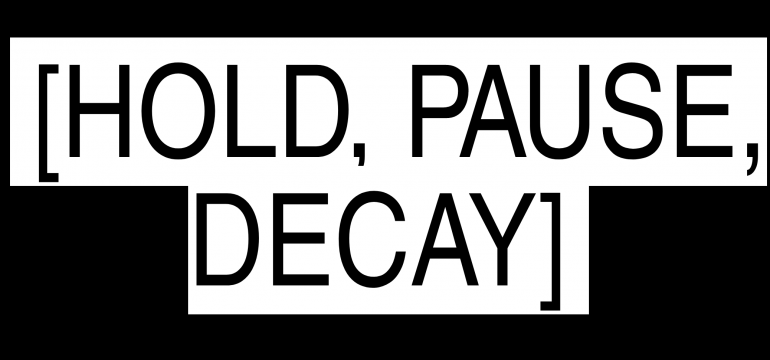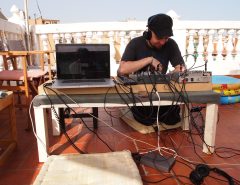Dear Reader,
Autumn Royal
This expression regards my role as editor of Disclaimer, an online journal, published by Liquid Architecture, for new thinking and writing on listening and sound.
As you read these lines, I encourage a focus on how letters form sequences, are subjectively absorbed and then reformed within your mind. Such a process involves inhalations and exhalations. Depending on bodily and spatial conditions, we all comprehend and interpret text distinctively. There’s no such thing as common sense, only socially dominant expectations of understanding.
This communication and your act of reading correspondingly generates an unfolding, resulting in profits of sound. What a cluster — just try to hold such a spiral in your mouth. Please, feel free to spit it out: all soil requires liquid and you may absorb or reject as you need.
With a full disclaimer: I only realise just how much I miss a beloved person when I can no longer recall the reverberations of their breathing. The sensations of being distant from the lives we deeply care for may muffle and stifle our voices and our imaginations. Yet, an absence doesn’t always equal a lack — aching edges may also merge into states of hope and possibilities.
For me, a summary of what I wish to voice within this letter is mostly and especially held within the below lines by the poet Lucy Van:
I am very much over-introducing things
And, of course, very pleased to meet you
In this extended preface
You have a beautiful face
Especially behind this door, where I stand
In infinite regress with the doorkeeper
I bloody love a good door
Where did you get it?
How does it sound when it opens and shuts
Together with Van’s stirring articulation of opening and shutting of doors, this letter isn’t simply an announcement, but rather a demonstration of the generative interchanges Disclaimer longs to support.
By prioritising varying expressions of sound and listening, Disclaimer hopes to amplify forms and reformations: to echo. All echoes resist the concept of purity and although there may be a delay, it isn’t devoid of reflections and reminders — a reminder may be as regular or irregular as a heart beat — each beat being a rhythm associated with our socially conditioned acknowledgment of time. While time is currently and routinely surveilled via digitised devices, there’s still a resonance relating to the textures generated by the (apparently) outmoded ticking clock. Nothing is ever left unmarked, regardless of how soft or insignificant certain sounds might appear to be.
All mediums of communication (email, text, phone call or social media notifications) are inherently political manifestations of sound. We often sense messages and/or notifications pulsating against our bodies regardless of whether the vibrational modes of our devices are active or not. I’m unashamed to consistently conjure the insights of Cecilia Vicuña, who states that articulation ‘only becomes poetry when its structure / is made not of words but forces’. Sounds and listening become forces regardless of how we distinctively comprehend them. No matter who or where we are, we all experience sound and listening (even if such phenomenological interpretations aren’t conventionally felt or observed). This is why Disclaimer will work towards rupturing dominant and unchallenged explorations of sound, as well as listening in order to support the multifarious existences of our current droning states.
I value assorted forms of reading, just as I’m dependent on various forms of listening. As such, I turn towards the often quoted Pauline Oliveros and her advice to: ‘Listen to everything all of the time and remind yourself when you are not listening’. To connect Oliveros’ poetics of listening to writing about sound – I reach out towards symbolism and the concept that the throat may form a volatile and sensitive opening of bodies.
Bhanu Kapil describes the throat as being ‘knotty, a circadian complex of bones’. It’s Kapil’s description of the throat that provokes a muscle memory of me hearing/dreading my father’s Harley Davidson roaring towards our weatherboard rental, revving up the steep and uneven concrete driveway. The Harley Davidson engine projects such a distinctive audial emission that I was, until researching for this letter, swayed by the urban-myth this sound was indeed patented. As in, despite Harley Davidson applying for a sound trademark of their V-twin engine in 1994, the company withdrew this application for trademark in 2001. Regardless of this legal formality, no other sound forcefully throbs within my tendons and manifests such tension between my shoulder blades. Such a reflection of how this sound and its associations influenced my formative years is also credited to being my introductory awareness of the emotional, social and economic issues related to sound. Perhaps this is what Roland Barthes meant when he writes that: ‘Hearing is a physiological phenomenon; listening is a psychological act’.
If I’m to reveal my current listening states, one the most reassuring sounds I’m fortunate enough to absorb is created by a housemate practicing piano in her bedroom. I live with three other people in a small – yet appreciated – rental: a space we all acknowledge has thin walls as leaky and porous as our guts. When I hear my housemate positioning herself at the keyboard, I automatically stop concentrating on what I’m doing so I that may sense how her fingers press down and into the keys. It’s usually at this point at which she begins to sing – her voice nourishes me in my moment of overhearing. Most mornings, I also hear my housemate rise earlier than myself and perceive her refilling and boiling the kettle, the sliding down of bread into the toaster and the closing of the backdoor when she’s ready to make the tram ride to work. All of these sounds are necessary so that she may substantially participate in her employment for the sake of survival beyond simply paying rent. These morning sounds of preparation are therefore essential for her to afford the time required so she may continue to compose her necessary practice. For me, such sounds are never monotonous.
My admissions will hopefully demonstrate that Disclaimer will devote attention toward the documentation of crucial sound and listening practices of those who have previously – and are still continuing – to be subdued. The distortion, withholding and suppression of sounds creates tangible doubt, ultimately risking actual disquietude and harm. Sounds, like silences, are never neutral – neither is the act of publishing.
I will leave you now, dear reader, with a resonating appreciation for your attention, as well as with a question (whilst seemingly rhetorical) which may be subjectively answered via your own interior/exterior voices: do you hear me?
With sincerity,
Autumn Royal





Leave a Reply
Lo siento, debes estar conectado para publicar un comentario.